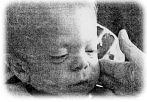From the Times Herald-Record: Wednesday, May 10, 2000
West Park: Bill Skojec’s son has a genetic disorder that’s so rare, few doctors have even heard of it – yet the father still has hope.
By Jeremiah Horrigan
The Times Herald-Record
jhorrigan@th-record.com
Bill Skojec takes hold of a file folder almost as fat as a Manhattan telephone directory. He flips through the folder’s tattered pages.
“This is where I try to keep track of the people I need to talk to, the researchers and geneticists and government people,” he says. Seated next to him in a tabletop baby seat, Skojec’s 15-month-old son Alexander plays with a favorite toy bell.
Skojec finds what he’s searching for, the number of an FDA official who he believes can say something about sialidosis, the rare genetic disorder that is slowly killing his son.
A call to the FDA speaks volumes about Skojec’s plight: queried about the disease, the FDA official politely says he’s never heard of it. A hurried conference with colleagues results in distant recognition of the disorder and the suggestion that the caller try another number deeper within the bureaucracy.
There are no treatments available for sialidosis; not more than 100 cases have ever been reported. What faint hopes the Skojecs had in gene therapy dissolved for them when the government suspended therapy trials after a Pennsylvania teen-ager died following treatment several months ago.
“It’s a very difficult situation,” says Dr.David Kronn, director of the Inherited Metabolic Diseases Center at Westchester Metabolic Center. Kronn diagnosed Alex’s disease.
There’s been far too much anticipation about what gene therapy will do — it’s been over-hyped. We’re liable to see some of the predictions come true in our lifetime, but not in Alex’s.”
 “When a disease is very rare, there’s less pressure and far less money to find answers,” Kronn says. Wherever Bill Skojec or his wife look, answers elude them.
“When a disease is very rare, there’s less pressure and far less money to find answers,” Kronn says. Wherever Bill Skojec or his wife look, answers elude them.
Their hope for Alex burns, but it’s a far-off glimmer in constant threat of being extinguished, Somehow, their spirits stay aloft.
Sometimes it’s no easier to find a genetic researcher looking for a cure than it is to find a baby sitter willing to watch over Alex while his parents make their livings. Bill Skojec lives in Hyde Park and is a psychologist at Saint Cabrini Home in West Park; his wife, an attorney, asked not to be identified for reasons relating to her job.
There are no sialidosis support groups; the disease is so rare, and so rarely studied, that a geneticist with a single case study can call him or herself an expert.
Through Internet searches, the Skojecs have been able to contact only a single other couple whose child suffers from it, a couple living in Ottawa.
The Skojecs don’t know how long Alex has to live. All they know is their son suffers from a progressive disease whose debilitating effects cannot now be stopped.
Bill Skojec’s attempts to connect with experts as well as anyone who might help his son has led him to write about Alex. A quiet, soft-spoken man of 41 with the physique of a weight trainer, he says he trusts the written word more than the spoken:
“What is most amazing about Alex is that he does not seem to realize that he has no hope for a future. He smiles and giggles much of the time. In fact, to see him, one would not readily recognize a problem
Alex is a playful kid, as easily amused as any child his age by adults playing peek-a- boo in his smiling face. But, unlike other kids his age, he can’t sit without support; his father doubts he’ll ever see his son stand or take his first step.
But Bill Skojec’s knowledge of his son’s probable fate doesn’t—can’t— stop him from doing everything he can to beat the odds.

“I call and It takes forever but I’m always hoping to find a lead that will somehow link up with another bit of Information somewhere else…“
All I can do is keep trying to save my son’s life,” he says, holding Alex in one arm and the file folder in his other hand. “I may not succeed, maybe not for Alex, but maybe for someone else’s son.”